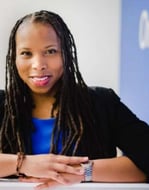
The Path to Top STEM Careers for Black Men Starts in K–12 Classrooms
Black male math teachers send a powerful message to Black students about their future in STEM fields. More should be done to increase their numbers in the classroom.
Do Black men do math? I was asking myself a racist question but, when I was in high school, the numbers did not lie—in my honors and advanced placement math classes, I was always the only Black male.
I was unable to question these numbers because, as a teenager, I was unaware that schools tracked students based on culturally biased test scores. I was unaware that tracking perpetuated racial underrepresentation in honors and advanced placement courses. And so, in my inability to question racist systems, I questioned myself as a Black male: Why do I never see anyone who looks like me in my advanced math classes? Am I supposed to be here? Will I be able to keep up with all the other students?
Self-doubt begat struggle. My A’s became C’s in my honors precalculus class during my junior year, and I began to wonder if my peers were questioning my ability and belonging as well. But as the only Black male in honors precalculus, I realized that my failure could implicitly confirm a racist narrative that Black men can’t do math. To disrupt that narrative, I doubled my efforts, aced my exams, was selected for AP calculus, and graduated in the top 10% of my class. I had confirmed for myself that Black men can do math, but the idea that they don’t still haunted me—especially when, in my first college math course, I was the only Black male in a room of 300 students.
I became a math teacher to challenge the perception that Black men don’t do math. That challenge started in my first week of teaching when a student named Daniel did not believe I was his math teacher because he “never had a Black guy as a math teacher.” Daniel, also a Black male, was not commenting on my inexperience as a math teacher, but on his lack of experience with Black men in math. And if Black men don’t do math, then careers in science, technology, engineering, and math (STEM)—our county's most lucrative, in-demand fields—are not for us. Left unchecked, this belief only further separates us from the socioeconomic mobility that America’s history of injustice has already made difficult to attain. What’s more, the fact that nearly 70% of full-time scientists and engineers are white threatens the safety of Black and brown communities. Consider that facial recognition software misidentifies Black people up to 100 times more often than white men due to researchers training artificial intelligence with facial data sets that are more than 80% white. As police departments begin using flawed facial recognition software to identify suspects, higher rates of mis-policing and mass incarceration in Black and brown communities will follow. Fewer Black faces in math related fields contribute to more Black faces behind bars.
“If Black men don’t do math, then careers in science, technology, engineering, and math (STEM)—our county's most lucrative, in-demand fields—are not for us.”
Yet, Black men have been doing math for quite some time. Kelly Miller, one of the first Black people to receive a Ph.D. in mathematics, went on to establish the graduate program in mathematics at Howard University in 1901. David Harold Blackwell’s Rao-Blackwell theorem led him to be the first Black inductee into the National Academy of Sciences in 1965 and first tenured member of faculty at the University of California, Berkeley. And in 2013, just three miles from Daniel’s and my school, Baltimore Ravens lineman John Urschel was completing his Masters in mathematics and preparing to enroll for his Ph.D. in applied mathematics from the Massachusetts Institute of Technology. But despite this legacy of accomplished Black male mathematicians, white people still outnumber Black people 9-to-1 in fields related to science, technology, engineering and math.
The problem is not that Black men don’t do math; the problem is that Black kids don’t see them. Bill Gates, Paul Allen, Steve Wozniak and Steve Jobs—all white men—were the tech giants of my ’90s upbringing. My doctor, dentist, and optometrist visits were almost always with white men and women. Bill Nye, David Suzuki, and Sam Beckett were the big names of popular science before Neil deGrasse Tyson’s mainstream following grew. And like Daniel, my student, I never had a Black male math teacher—or Black male teacher in any subject for that matter—until I got to college.
Black men are severely underrepresented in a teaching force of 63% white women. When the majority of the education that our children receive comes from one demographic, we risk students drawing false connections between education and race or education and gender. Indeed, Carmen Astorne-Figari of the University of Memphis found that students of color often switch from predominantly white STEM majors to majors that “look like them.” Leaving this misrepresentation unchecked upholds the racist myth that Black men don’t do math and limits what Black boys believe is possible for their future. Breaking this myth begins with hiring more Black male math teachers. But with Black men comprising less than 2% of the teaching force, how do we recruit Black men into a profession that they don’t see themselves in to begin with?
Through policy. In 2005, Baltimore City recruited 108 teachers from the Philippines to staff its vacant STEM teaching positions and, within four years, the number of Filipino teachers in the city grew to more than 600. If Baltimore could afford to pay for recruiting fees and visa sponsorships to build an international teaching force, Baltimore City Schools and other predominantly Black school districts can afford to invest in Black male teacher recruitment at home. Black school districts can afford to create shadow-a-teacher programs for Black male students to learn more about the teaching profession. They also can afford to provide early teacher training programs for Black male students while they are still in high school. School districts can afford to provide partial or full scholarships for Black male students who major in education and commit to returning to their school district to teach. And while we fight for policy change, Black school districts can afford to stack mentorship programs and career panels with STEM leaders of color to change the narrative about what is possible for Black men. What we cannot afford is another generation of school staffing policies that reinforce the racist idea that Black men don’t do math.
If our young Black men can see themselves in STEM, we will see more Black men in STEM fields.
Artemus Werts (Baltimore '13) is a Principal In Residence at Foundation Academies in Trenton, New Jersey. He has also completed a Fulbright fellowship in South Korea, taught math at Paul Laurence Dunbar High School in Baltimore, Maryland, and served as the director for data and school impact with Teach For America-Baltimore. Werts holds a bachelor’s degree in history and Africana studies from Rutgers University and a master’s in education from Johns Hopkins University.
We want to hear your opinions! To submit an idea for an Opinion piece or offer feedback on this story, visit our Suggestion Box.
The opinions expressed in this piece, and all others in our Opinion section, represent those of the authors and do not necessarily reflect the views and opinions of the Teach For America organization.
Sign up to receive articles like this in your inbox!
Thanks for signing up!
Content is loading...









